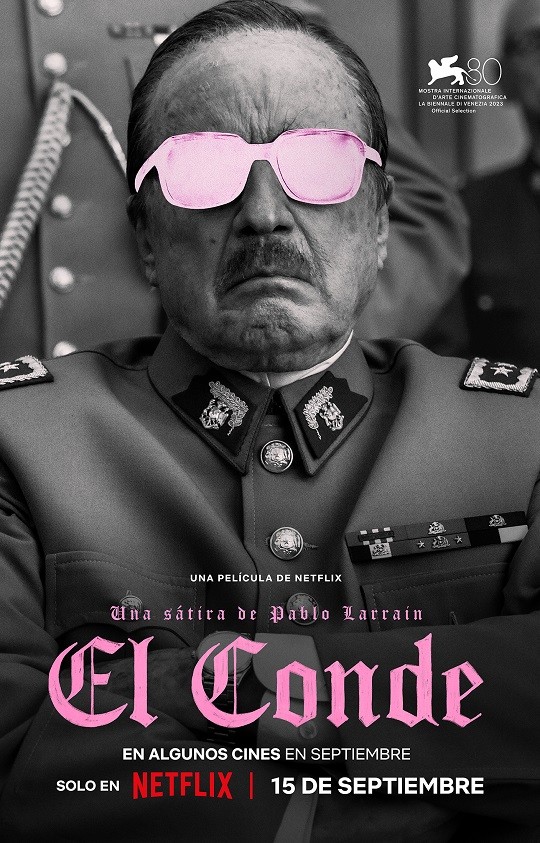- Date of Release: 15 September 2023
- Genre: Comedy, Fantasy, Historical
- Language: Spanish
- Watch On: Netflix
El Conde
Introduction
It is still a Tuesday and I had one day in hand to explore for content before the weekend releases start trickling in from Wednesday. With that, I finished watching the new Chilean film El Conde which is now streaming on Netflix. This film was out on the same week wherein I wasn’t well, and hence El Conde had to move on the back burner. But I was quite intrigued with its poster and its short summary, which prompted me to visit it sooner than expected.
I have always admired political satires, simply because they are a rarity these days. But when it did come to El Conde, I was particularly interested given that it had a setting of the South American country, Chile, a place whose political landscape was oblivious to me. I did some reading over the internet and got to know of the dictatorship that was prevalent in the country fron the early 1970s to the 1990s, with the rulers of the land having pulled off a military coup to displace the then democratic leader. The man at the centre of it was Augusto Pinochet who went on to rule the country for almost two decades. And the idea with El Conde was to take this character and weave a satirical tale around it. So then does El Conde manage to impress, lets find out.
Story & Screenplay
El Conde follows the story of Augusto Pinochet reimagined as a 250 year old vampire who finally wishes to retire. But the vultures around him won’t let him go without a final bite to the ‘cherry’. The story here is an indulgent black comedy with dollops of satire and elements of horror that does account for a unique watch. Besides, the subject itself is a ‘punch-up’ narrative in a story that did mix the historical events with fiction. The screenplay standing at a shade under 2 hours moves at a leisurely pace but the main attraction here is the reimagination of a recent dictator, that the world knows very little about. Also, Mild Spoilers Ahead including the ending being explained.
The drama does open on a hilarious note, almost opening in the 18th century amidst the French Revolution, with the introduction of a young protagonist who is witness to all the chaos around him. Suddenly, he discovers a fetish of sorts for blood, a trait that is used as a satire in the reels to follow, almost as a representation of a higher official sucking the blood of commoners(simply loved the analogy). For viewers who are keen observers of Geo-Politics doing the rounds even in current times, would be able to equate the beats of the drama with modern times as well. The drama does take a time leap, wherein our protagonist, now a vampire has decided to settle in a ‘kingless’ land which is poor and out of sight with respect to the world politics. The traumatization begins until the writers introduce the first conflict in the drama wherein the protagonist wishes to retire by refraining to drink blood(lol).
The proceedings are a searing commentary on the ideology of a person that so easily rubs on to people around him. The age old saying of ‘As you sow, so shall you reap’ was never more relevant than in this case, with there being multiple stakeholders to the throne, all with vested interests. The mood of the drama begins to get cerebral with the introduction of a couple of interesting characters along the way – Carmencita, an embodiment of opposition who soon wraps herself in the ‘game’ with a hilarious sequence featuring her flying. The other Margaret Thatcher, another popular figure in the political history of the world, the Iron-Lady who did rule the British around the same period as the protagonist had in Chile. The introduction of the latter(as the mother of the protagonist) was a burning statement on how the combination of power can truly be detrimental to the world, while the former also was representative of the new found zing in the aging protagonist, in a hilarious turn of events!
The events leading to the final act are brutal and bittersweet, while also playing up on the black comedy of the film. The character of Carmen firstly brought to a place wherein the protagonist has collected the heads of his other fetishes, cut to her death with Carmen being killed off exactly as Maria, a character whom the protagonist had a crush on, years ago! The final shot of the film might bamboozle many viewers as the stark monochrome quickly breaks into colour. The monochrome did represent the gloom of the country which is put to rest after the retirement of the protagonist, with the screen breaking the hues of different shady colours. Yet, the final shot of a young Margaret dropping her son(who is none other than the protagonist himself) is a mere representation that ideologies do not die, instead they are compounded and spread over generations. The screenplay might seem a little too indulgent but if you are keen to penetrate through its layers and absorb its commentary while also wishing to read about the real-life dictator, then you will thoroughly be invested in the drama.
Dialogues, Music & Direction
The dialogues are conversational with a zing of humour that does leave a lasting impact. The BGM is subtle and quite nuanced, tactfully raising the emotions of every scene. The cinematography is outstanding representing gore in the form of poetry in motion. Also, the creative decision to use monochrome throughout the narrative was a site in itself while being aestherically beautiful. The editing is crisp and sharp. Director Pablo Larrain does not hold back with his narrative style which is pretty much in your face while being unapologetic and unabashed. Also his strong leftist views are in full bloom here that adds a fresh perspective to the right-ist agenda. He does highlight that there might be sympathizers of the protagonist in what may have been the best period for Chile during his tenure. Yet, the perspective that he adds is in the form of blood of ‘Blue-Collared’ people which is representative of the current economic situation that Chile finds itself in. The direction was cerebral and quite absorbing with the messaging.
Performances
The performances are outstanding here. Stella Gonet as Margaret is top notch despite a limited screen time. Alfredo Castro as Fyodor is quietly menacing and does a wonderful job here. Gloria Munchmeyer as Lucia is calculative and brilliant in her cerebral portrayal of a ‘vulture’. Paula Luchsinger as Carmencita is layered in her character and she id terrific to watch. Jaime Vadell as El Conde(translated to The Count) is phenomenal with his body language and mannerisms. The amount of physicality that he brings to his character was also heartening to watch. It was honestly a towering act by a wonderful performer.
Conclusion
El Conde is a gruesome and intoxicating satire of fascism with dollops of dark humour that makes for a brilliant watch! Available on Netflix and Highly Recommended!




